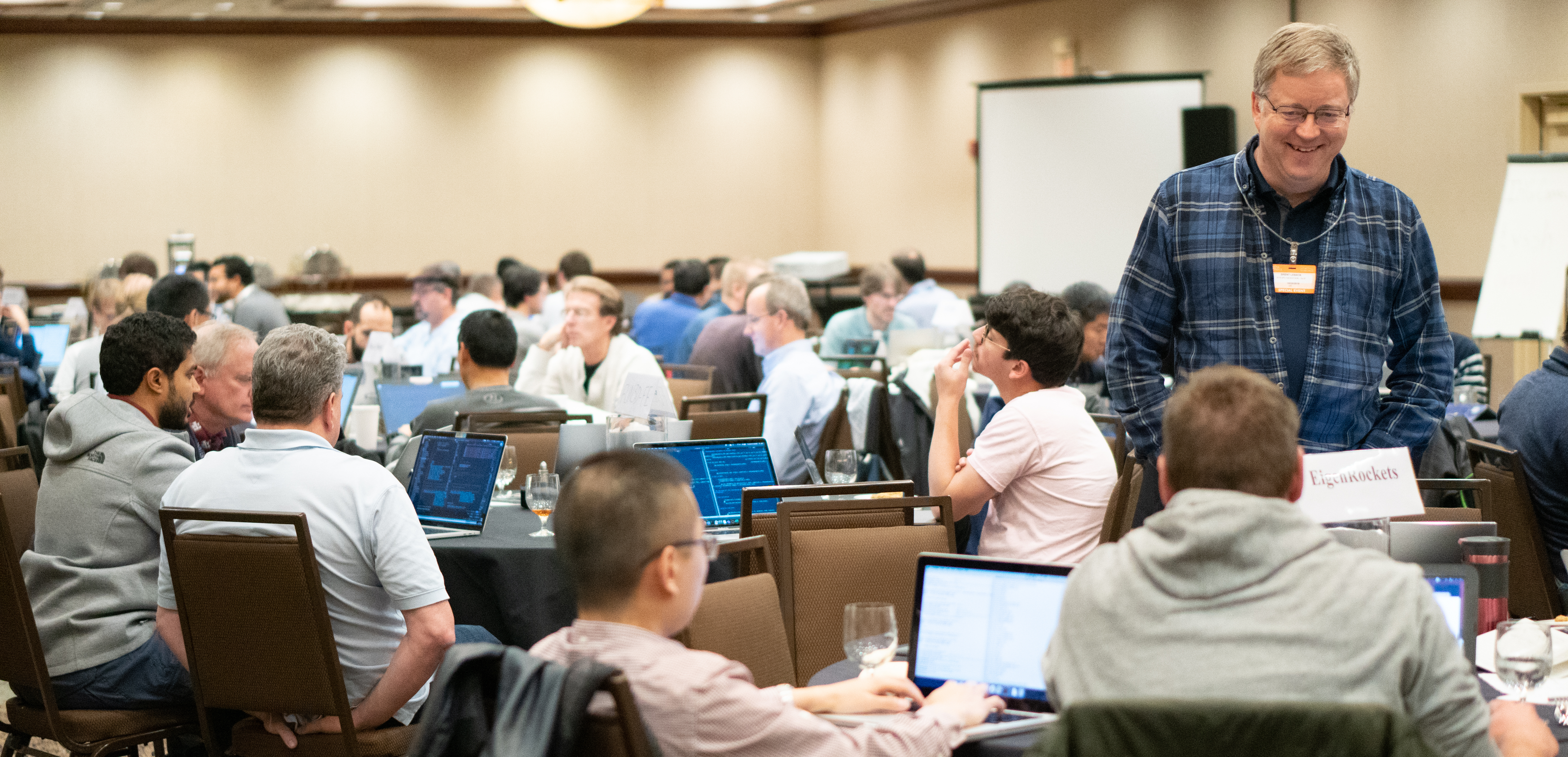
OLCF GPU Hackathons
Each year, the Oak Ridge Leadership Computing Facility (OLCF) works with our vendor partners to organize a series of GPU hackathons at a number of host locations around the world.
What is a GPU hackathon?
A GPU hackathon is a multi-day coding event in which teams of developers port their own applications to run on GPUs, or optimize their applications that already run on GPUs. Each team consists of 3 or more developers who are intimately familiar with (some part of) their application, and they work alongside 1 or more mentors with GPU programming expertise. Our mentors come from universities, national laboratories, supercomputing centers, and industry partners.
Note
There are a variety of programming models available to program GPUs (e.g. CUDA, OpenACC, OpenMP offloading, etc.) and you are welcome to use any of them at these events.
Why participate?
If you want/need to get your code running (or optimized) on a GPU-accelerated system, these hackathons offer a unique opportunity to set aside the time, surround yourself with experts in the field, and push toward your development goals. By the end of the event, each team should have part of their code running (or more optimized) on GPUs, or at least have a clear roadmap of how to get there.
Target audience
We are looking for teams of 3-6 developers with a scalable** application to port (or optimize on) GPUs. Collectively, the team should know the application intimately.
Note
** We say scalable here because we’re typically looking for codes intended to run on multiple nodes (e.g. MPI-enabled), although porting/optimizing such codes on a single node during the events is encouraged whenever possible.
Virtual hackathon format
Typically, these hackathons are in-person events, where each team (app developers + mentors) sits at their own round table in a single large conference room. This structure allows teams to hack away on their own codes, but also to interact (ask questions, give advice, etc.) with members/mentors from other teams when needed.
To recreate this environment in a virtual setting, we will be using Zoom + Slack. Zoom will be used as the main online tool due to its breakout room capabilities; there will be a single Zoom session, where the main room will be used for presentations, and breakout rooms will be used by individual teams (for screen sharing and verbal communication). We will also set up a Slack workspace for communication between all participants, and individual team channels for communication within teams (chat, sharing code snippets, etc.).
Ok, so how do I attend?
First, you must decide which event you’d like to attend (use link below to find a hackathon whose dates make sense for your team), and then submit a short proposal form describing your application and team. The organizing committee will then review all proposals after the call for that event closes and select the teams they believe are best suited for the event.
Please visit openhackathons.org/s/events-overview to see the current list of events (new ones added throughout the year) and their proposal deadlines. To submit a proposal, click on the event you’d like to attend and submit the form.
Note
The OLCF-supported events are a subset of a larger number of Open hackathons organized around the world. Look for hackathons with the OLCF logo to find events supported by OLCF.
Want to be a mentor?
If you would like more information about how you can volunteer to mentor a team at an upcoming Open/GPU hackathon, please visit our Become a Mentor page.
FacultyHack
The Oak Ridge Leadership Computing Facility (OLCF) works in partnership with HackHPC and Science Gateways in organizing FacultyHack for faculties in colleges and universities across the United States (US).
What is FacultyHack?
FacultyHack is a multiple week event in which faculty teams from colleges and universities across the US work with HPC experts in revamping their courses (syllabus) such that they include HPC content. The aim of this is to introduce students underrepresented in HPC to the field and provide a pathway to HPC related careers. Each team consists of the faculty teaching the course, a faculty mentor, and an HPC expert. The HPC expert advises on suitable HPC material and hands-on exercises for the course while the faculty mentor assists with pedagogical structure and implementation. HPC mentors are mostly from national laboratories, supercomputing centers and the wider HPC community.
Event Format
The hackathon is held virtually on zoom with a final in-person poster session at the Science Gateways (SCGI/SGX3) conference usually held in October. Teams work with their mentors during regular weekly zoom check-ins and also as needed. At the end of the event, each team has a completely revamped course with high-performance computing content included. Posters highlighting modifications to the courses are presented at the Gateways conference to climax the FacultyHack.
Target audience
Computer Science, Data Science, Mathematics and Engineering faculty or closely related discipline area faculties. This is not limited to community colleges, minority serving institutions, historically black colleges and universities, Hispanic-serving institutions, and liberal arts colleges.
Note
Priority will be given to colleges and universities underrepresented in HPC.
Why participate?
At the end of the hackathon, participating faculty will have their courses revamped with content that will help position their students in HPC oriented career paths. Also, faculty are presented with the opportunity of building collaborations with other participating educators as well as HPC experts. Collaborations with HPC experts could lead to future research partnerships as well as experts given guest lectures to students of the revamped or related courses.
How to apply?
Applications are accepted yearly with due dates around mid September. For link to the applications and more details, please visit sciencegateways.org/faculty-focused . If you would like to volunteer as a mentor, please apply at the link and specify participation as a mentor.
Who can I contact with questions?
If you have any questions about any of the Hackathon Series, please contact OLCF Help at (help@olcf.ornl.gov).